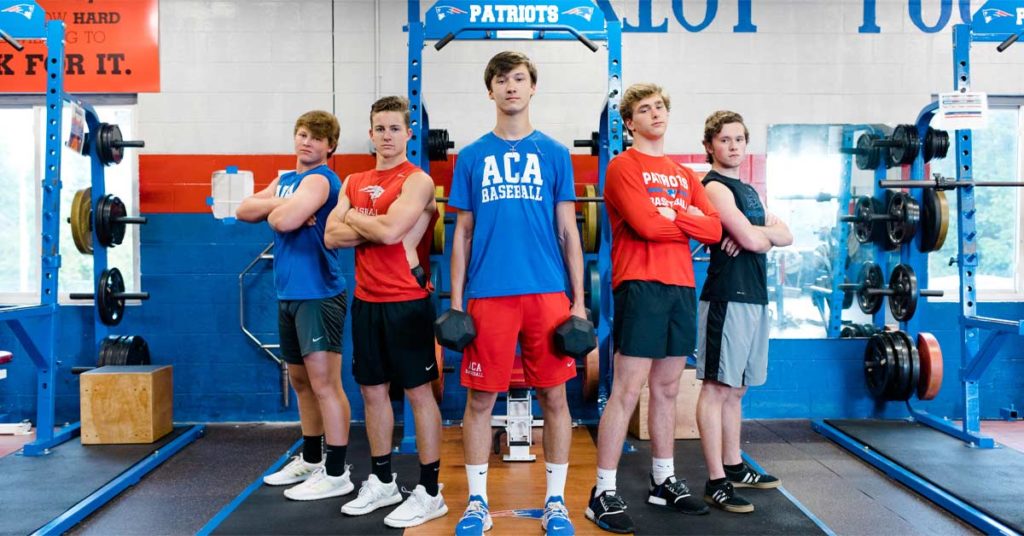
Kade McGee is the Director of Strength and Conditioning for American Christian Academy in Tuscaloosa, Alabama. Kade received his undergraduate degree from the University of Alabama, where he interned in the weight room working with various sports. He then went on to earn his master’s degree from Xavier University in Coaching and Athletic Development. Kade is a proud member of the NHSSCA and serves on the Alabama state advisory board.
Freelap USA: What sparked the idea of having “strength teams” in your high school performance classes?
Kade McGee: I originally saw the idea from Micah Kurtz a few years back before I even got to ACA, and I remember thinking it was something I would like to do once I found a job somewhere. I then forgot about the idea, and I was sitting around one day trying to come up with some ideas to motivate our kids and make our strength and conditioning classes more fun, and that idea about the strength teams came back to me.
I tried it out for the first time back in January 2020. We were rolling pretty well with it, and the kids were really excited about it, and then the pandemic hit. We continued to track points through the pandemic that spring semester, and it turned out to be really cool. I think the kids really enjoyed it, so we decided to keep doing it each year.
Freelap USA: Break down how you created your rubric for your teams and how they score points.
Kade McGee: Depending on class size, I divide the kids up into teams of 5-10 players. I came up with a variety of ways to earn points and lose points. This helped me come up with ways to not only motivate our kids and reward them for doing what I asked, but also hold them accountable for not living up to our standard or not complying with our program expectations.
We have five ways that you can lose points for your team and nine ways you can gain points. So, there are plenty of opportunities for each team to gain points throughout the week. I tally up the points each week and post the standings in the weight room and on our social media account for the kids to see.
Point Deductions:
- Unexcused Absence = 2 points weekly deduction from team.
- Unexcused Tardy = 2 points weekly deduction from team.
- “Behavior” = 5-point deduction (being disrespectful toward Coach McGee or teammates; not doing correct weight or exercise; not following weight room rules).
- Demerit = 10-point deduction from team.
- Not Filling Out the Teambuildr Readiness Questionnaire = 2-point deduction from team.
Point Additions:
- WIN Weekly Competition = 20 points.
- BEAT Other Team in Class = 10 points.
- Move up Blocks = 10 points for your team.
- Personal Record = 10 points for your team.
- Leadership = 10 points for your team.
- Spiritual Training FCA = 10 points.
- PERFECT DAY = 25 points (Each teammate attacking the workout for the day with relentless effort and positive enthusiasm. Teammates encouraging one another and pushing each other to be the best they can be. Each person on the team GAVE THEIR BEST THAT DAY.)
- Post video to social media picking up trash anywhere around the school with the #CLEANACA = 2 points for team (must tag acastrength page on Instagram or Coach McGee on Twitter, Facebook).
- Post video or picture to social media eating a healthy snack or staying hydrated with the #23 = 2 points for team (must tag acastrength page on Instagram or Coach McGee on Twitter, Facebook) .
Freelap USA: Are your strength teams coed? If so, what is unique about the team dynamics in a coed weight room?
Kade McGee: Yes, our strength teams are coed. Our strength and conditioning classes are also coed, so it made sense to make the teams coed as well. I am a big advocate for coed groups at the high school level. Although it produces its own unique challenges coaching-wise, it makes for a fun environment. It is cool to see other guys cheering on other girls during competitions for points and vice versa.
Our kids will have to learn to work together with all kinds of people one day, and coed strength teams gives them an opportunity to experience those challenges, says @kade_mcgee7. Share on XThe dynamics are unique in that any other teams our kids play on are not coed, so this gives them an opportunity to learn how to communicate and work with the opposite sex providing an opportunity for school cohesion and teamwork. Like I mentioned above, our kids are going to have to learn to work together with all kinds of people one day, and this gives them an opportunity to experience those challenges.
Freelap USA: How do you utilize social media to promote participation outside of the weight room?
Kade McGee: One of my favorite ways for our kids to gain points for their team is by posting a video to their social media account of them picking up trash anywhere on campus with the hashtag #CLEANACA. I love this because it teaches our students that no job is too big for them and that it is important to leave places better than you found them. Adding this incentive for points not only instills good habits of not walking past trash on the ground, but it is also teaching our students humility.
We are using positive reinforcement to reward good behavior, and by making them post it to their own social media account, it draws awareness for other students in our school who don’t participate in our program and shows kids from other schools that this is how we do things at ACA. We value picking up the trash because leaving places better than you found them is important to us.
Another way they can utilize social media for points is by posting a picture or video of them drinking or eating something healthy throughout the day and posting it to their own social media account with the hashtag #23. That 23 designates the nutrition education program that we use to teach our students basic nutrition that will help them make better decisions while they are outside of the weight room.
We preach to our students that it is not about the one hour they are in the weight room with me, but really the other 23 hours they are outside of the weight room. The choices they make outside of the weight room during those 23 hours is what will have the greatest impact on their development. So, we want to reinforce and reward those good behaviors. Our kids have fun with this and will send in countless pictures of water bottles that they are drinking, but if this is what it takes to make them think twice about grabbing a soda or a sugary snack, I take that as a major win!
Freelap USA: In what ways has this impacted your student-athletes?
Kade McGee: These teams have impacted our students greatly by reinforcing good behavior and punishing bad behavior. We lay out the rules and guidelines well in advance, so our students are clear on what gives them points for their teams and what deducts points from their team. We lay out the standards, and if they meet them, they are rewarded. If they don’t, their team will be penalized.
This teaches them accountability and to think about others before themselves. When you know that if you miss class unexcused, you will cost your team points, it makes you think twice about letting your teammates down. When you want to pick up a soda in the drink line in the lunchroom but decide to pick up a water instead so you can get points for your team, that is us instilling discipline into our athletes, and they don’t even realize it.
This system teaches them accountability and to think about others before themselves…it instills discipline into our athletes, and they don’t even realize it, says @kade_mcgee7. Share on XThis also teaches our students how to compete every day. Learning how to compete is a skill that I think is important for our kids to learn, especially when it involves other people on your team. Our students are going to always be a part of a team for the rest of their life. They need to learn that their actions don’t just impact themselves, but they impact others on their “team.”
At the end of the year, the team that wins receives a poster on the wall that I promise them will stay in the weight room forever. We get a professional photographer to come and take pictures for the poster. We really try to make it a big deal and make the kids feel special for winning.
That poster is special to them because they leave their mark on this school and this program. We always preach to our kids about leaving places and people better than you found them. They know that if they earn their face on the wall, they left our program better than the way they found it.
Since you’re here…
…we have a small favor to ask. More people are reading SimpliFaster than ever, and each week we bring you compelling content from coaches, sport scientists, and physiotherapists who are devoted to building better athletes. Please take a moment to share the articles on social media, engage the authors with questions and comments below, and link to articles when appropriate if you have a blog or participate on forums of related topics. — SF

